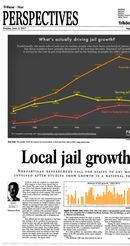Our favorite news coverage of our work in 2017
Journalists who use our research in new, creative ways play a crucial role in engaging the public with criminal justice issues. These are some of our favorite stories of 2017 that feature our work.
by Wendy Sawyer, December 28, 2017
One of our goals here at the Prison Policy Initiative is to engage the public in current criminal justice issues. Journalists who use our research in new, creative ways play a crucial role in that process. These are some of our favorite stories of 2017 that feature our work, starting with the most recent:
-
 The end of American prison visits: jails end face-to-face contact – and families suffer
The end of American prison visits: jails end face-to-face contact – and families suffer
Shannon Sims
The Guardian
December 9, 2017
For three years, we’ve been tracking the quiet spread of virtual jail “visits” in jails across the country; fortunately, a surge of hard-hitting journalism is pushing back, building off of our research and exposing the harms of eliminating family visits in favor of video calls. In Shannon Sims’ deep dive into the video calling industry for The Guardian, she investigates the switch from in-person family visits to expensive video calls in one jail outside of downtown New Orleans. The Guardian’s article raises another important point that we haven’t raised in our own work or seen raised elsewhere: does international human rights law require jails to allow in-person visitation? According to Sims, this is one more reason that using video calling as a replacement for real visits is bad policy.  NBA Pistons Owner Under Fire for Deal on Inmate Phone Service
NBA Pistons Owner Under Fire for Deal on Inmate Phone Service
Todd Shields
Bloomberg
July 24, 2017
When the sale of prison and jail telecom giant Securus Technologies to Platinum Equity was announced in May, we joined with other advocates to ask the FCC to block the sale and investigate the company’s ongoing defiance of FCC regulations. We also questioned why Platinum’s owner Tom Gores – who has built a reputation for helping recovery efforts in Detroit and Flint – would invest in a company that charges Michigan residents as much as $8.20 for a single minute of a call from an incarcerated loved one. Bloomberg picked up the story and ran with it, in the process producing a comprehensive review of the biggest news related to the prison and jail phone industry in the past year.-
 What’s actually driving local jail growth?
What’s actually driving local jail growth?
Mark Bennett
Tribune-Star
June 4, 2017
Vigo County, Indiana, like many counties around the country, has plans to build a new, larger jail to accommodate its growing jail population. Indiana reporter Mark Bennett uses our report Era of Mass Expansion to explore the underlying causes of jail growth in the state, like its high rate of pretrial detention and the fact that 14% of its jail beds are held for outside authorities. Bennett’s reporting gives local and state authorities plenty of reasons to reconsider jail expansion. -
 The plunder of the American prison system
The plunder of the American prison system
Ryan Cooper
The Week
January 25, 2017
Ryan Cooper elegantly summarizes our Following the Money of Mass Incarceration report, with all its data intricacies, and pulls out the most salient threads for discussion. Going further, he connects the massive growth and abuses of the criminal justice system to the political economy of incarceration, concluding “the profit motive… tends to dissolve moral considerations.” -
 Driver’s Licenses, Caught in the War on Drugs
Driver’s Licenses, Caught in the War on Drugs
The Editorial Board
The New York Times
January 3, 2017
The New York Times Editorial Board responds to our December 2016 report, Reinstating Common Sense, unequivocally denouncing laws that automatically suspend driver’s licenses for drug offenses unrelated to driving and then charge costly reinstatement fees: “These laws… are simply cruel and stupid, and it is past time to expunge them from the books.” Strong editorial support like this fuels our advocacy work and the work of advocates in the remaining states that have yet to eliminate these outdated and counterproductive laws.
 The end of American prison visits: jails end face-to-face contact – and families suffer
The end of American prison visits: jails end face-to-face contact – and families suffer The plunder of the American prison system
The plunder of the American prison system Driver’s Licenses, Caught in the War on Drugs
Driver’s Licenses, Caught in the War on Drugs


